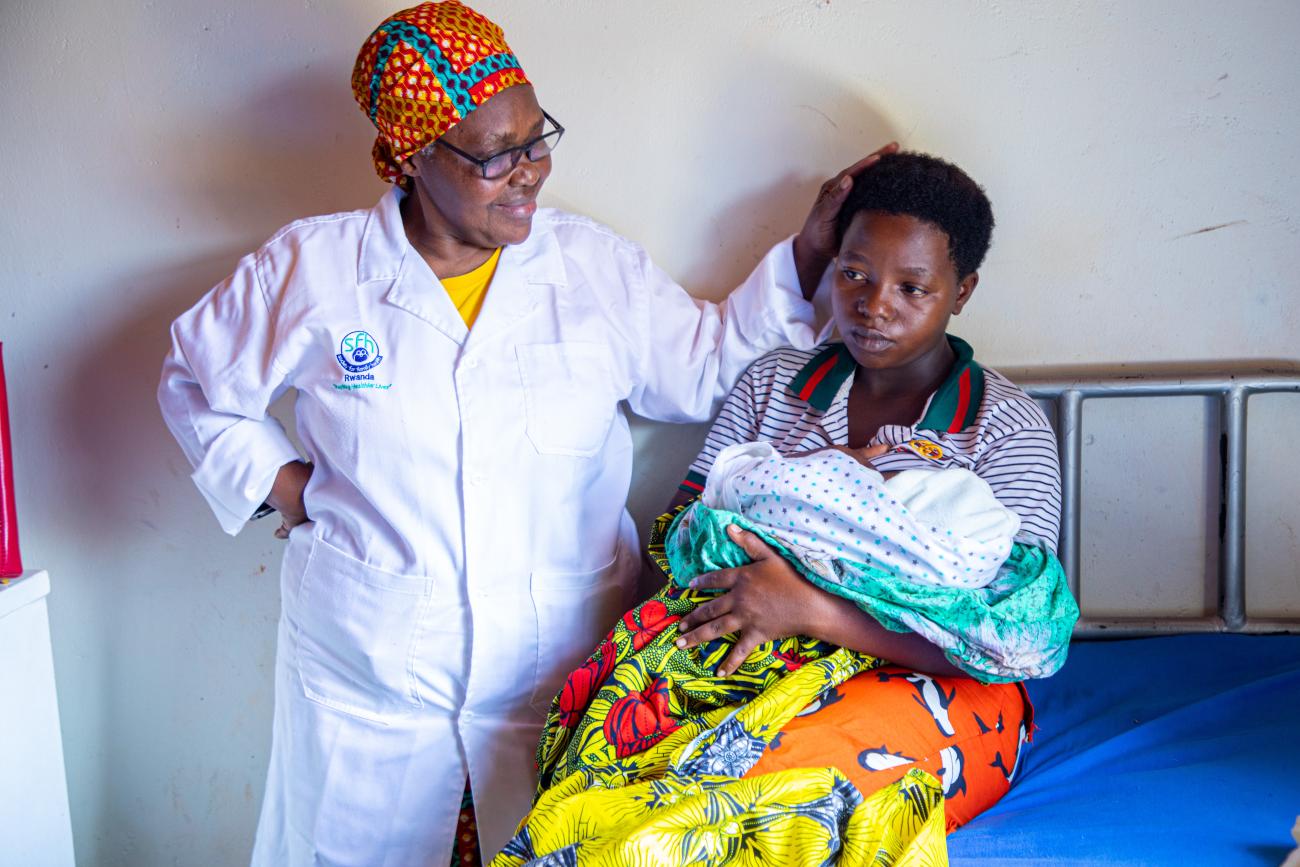When you enter Girubuzima Health Post-Batima compound, you get welcomed by the symphony of newborn cries, echoing with the joy of new life. The air is filled with anticipation as mothers of the little ones, born just a day before or on the cusp of their first breath, eagerly await their discharge to embark on the journey home.
Outside at the reception, several patients from the neighbourhood areas are comfortably seated, waiting to meet a health care provider and among them are young children, expecting mothers, and students, waiting for their names to be read to enter the consultation room.
Girubuzima Health Post-Batima is located in Mbuganzeri village, Batima cell, Rweru sector, Bugesera district in the Eastern province. This is approximately five kilometres from the main road heading to Nemba One Stop Border Post, Eastern Rwanda.
In the waiting room, two expectant mothers are tirelessly and patiently waiting for their time to exultantly cradle their lovely angels. Meanwhile, on another bed, Emillien Nimuyizere beaming with excitement had just given birth to a handsome baby boy eight hours before.
“This is my firstborn, I’m super excited, and I thank the nurses and management of Batima health post who have untiringly helped me to deliver my son”, The 25 years old and smiling mother said as she kept on prudently breastfeeding her baby boy.
The mother is in a healthy mood as she waits to be discharged in a few hours.
Madam Nimuyizere is among the 10 mothers who delivered from this health post in the first two weeks of June, in addition to 34 mothers who delivered at Batima HP in the previous month. Before the upgrade of this facility from First-Generation to Second-Generation Health Post, mothers like Nimuyizere and other patients were supposed to walk for around 20 km to access health services at Nzangwa Health Centre.
However, upgrading the new health post and extending services closer to the community has made their lives easier.
“It was so hectic. We used to spend almost 2 hours walking to Nzangwa Healthcare Centre. Today I used almost 45 minutes to reach here. We are all in jubilation, especially expectant mothers living around this area. Thanks to the United Nations and the Government of Rwanda” she said smiling.
Girubuzima Health Post-Batima serves five villages with over 10,000 people in the Rweru sector and provides services like Antenatal Care, Family Planning, Integrated Management of Childhood Illness (IMCI), Maternity care, as well as other basic healthcare services in general.
Anne M’Lurhe ABELA a senior nurse managing Girubuzima Health Post-Batima, says daily, they receive around 90 patients and there are plans to introduce new services like immunization.
“We have a team of 11 employees here, including nurses and midwives who work shifts even at night. We are always in touch with our counterparts at Nzangwa Health Centre to provide an ambulance in case of any complications to refer our patients to Nyamata District Hospital."
She says, unlike before, the health post has established a pharmacy where patients access essential medicines, and this reduces the time people used to spend going to pharmacies located in distant areas.
In collaboration with Society for Family Health (SFH) Rwanda, this Health Post is among the 28 others that are being supported under the UN Rwanda’s Joint Programme titled “A Thousand Health Posts in the Land of a Thousand Hills: Promoting Universal Health Coverage by catalyzing investments in financially and environmentally sustainable primary health care .” It brings together 7 UN Agencies, UNFPA as a lead agency, UNCDF, UNDP, UNICEF, WHO, UN-Habitat, and UNHCR.
Within their mandates, all participating UN Agencies are contributing to catalysing investments and forging strong partnerships to promote primary health care, globally perceived as the pathway to Universal Health Coverage where access to affordable healthcare services is delivered to the last mile.
“Our main target is to ensure the sustainability of these health posts to be able to provide quality health services to a bigger population in the Country,” said Kwabena Asante-Ntiamoah, UNFPA Representative.
Following the Joint Programme pilot, the uptake of healthcare services delivered by Second-Generation Health Posts increased more than 10-fold within a period of only six months, from 113 to 1,546 clients between July and December 2022. This shows that the Second-Generation Health Posts are responding to the real healthcare needs of the community, especially in cross-border areas.
Sustainability
On the issue of sustainability, Mr. Asante-Ntiamoah highlighted that the participating agencies, through UNCDF, are in the process of partnering with some local banks to structure a partial credit risk guarantee that will enable Health post managers to access affordable loans.
He further observed that the model will allow Health Posts operators to become active in sustaining what they do, which is different from traditional grants funding.
“This is the first pilot initiative in Rwanda where we are shifting gears from funding to financing and bringing together the public and private sectors, and United Nations together. We are working with the partners, and I am optimistic that this model will create that sustainability because it will be self-financing.”
Closing the gap in healthcare access
To complement the Government of Rwanda in its efforts to achieve Universal Health Coverage, the Joint Programme was established to drive the scale-up and functionality of health posts across the country and ensure accessibility, especially those furthest behind.
“The Joint Programme will improve the services provided by health posts to the citizens, including refugee camps, with a focus on rural areas. It does not mean we will build 1,000 new health posts, but rather that we will expand and strengthen the existing ones,” said Dr. Corneille Ntihabose, the Head of the Clinical and Public Health Services Department at the Ministry of Health.
With almost half of the world’s population lacking access to essential primary healthcare, establishing Service Delivery Points (SDPs) within a reasonable distance is one of the avenues to achieving Universal Health Coverage (UHC). In Rwanda, health posts have proven to be viable solutions in meeting the population’s healthcare needs at a community level, particularly in hard-to-reach areas. This Joint Programme also responds to various Sustainable Development Goals, especially SDG 3, “Good Health and Well-Being” and to the outputs of strategic priorities of the UN Sustainable Development Cooperation Framework to achieve the intended outcome “by 2024, people in Rwanda, particularly the most vulnerable, enjoy increased and equitable access to quality education, health, nutrition and water, sanitation, and hygiene (wash) services.”




